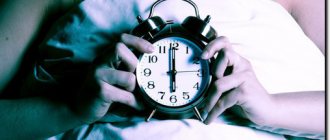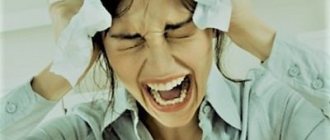Why do hangovers cause depression and anxiety?
Alcoholic depression is considered a mental disorder characterized by decreased self-esteem, feelings of guilt, loss of joy, causeless blues, despondency, and anxiety. In severe cases, patients experience suicidal mood.
Why depression begins to torment the next day after drinking alcohol can be understood if we take a closer look at the effect of the active component of alcoholic beverages on the body. Ethanol and its breakdown products affect metabolic processes occurring in the body. Including the exchange of neurotransmitters - proteins that regulate the functioning of the nervous system.
Mental disorder appears due to the use of alcoholic beverages
Deterioration in mood is associated with a drop in the concentration of dopamine and serotonin in the bloodstream. Serotonin ensures the adequacy of thought processes and increases the pain threshold. Dopamine is responsible for good mood and joy. By changing their exchange, a drunk person experiences mood swings - which is why a person with a hangover suffers from depression and anxiety.
During a hangover, the body suffers from serious poisoning. A special enzyme called alcohol dehydrogenase oxidizes ethanol in the body to acetaldehyde. The latter is much more toxic than ethanol. Under the influence of acetaldehyde, most organs and tissues cease to function normally. This is another reason why alcohol causes depression.
The breakdown of ethanol occurs much faster than its elimination. Acetaldehydes begin to negatively affect the main organ of the nervous system - the brain, destroying neurons and their connections, which explains on a physical level why depression takes hold of a person after alcohol.
Reasons for low mood when quitting drinking
The main reasons for the development of depressive states or the aggravation of those that existed previously when giving up alcoholic beverages:
- Psychological dependence on alcohol. A person who has been drinking alcohol for a long time gets used to using it as a remedy for bad mood, depression, anxiety, and poor health (often provoked by alcohol itself). Therefore, the inability to distance oneself from reality with the help of already habitual alcohol worsens a person’s mood, and during the period of getting rid of alcohol addiction, the alcoholic may rush to other extremes, find other ways to experience pleasure, for example, start gambling.
- Alcohol withdrawal syndrome. This is the so-called alcohol withdrawal, the main symptoms of which, with proper treatment, go away quite quickly, but residual disorders, such as anxiety, depression, can persist for a long time.
- Consequences of alcohol intoxication. With excessive and long-term consumption, alcohol negatively affects the functioning of the brain: it disrupts the functioning of certain zones, affects the sensitivity of the receptors of a number of hormones, and can lead to alcoholic encephalopathy, in which intelligence, memory, attention are significantly affected, sleep is disturbed, and somatic abnormalities are observed. Over time, some disorders may become less pronounced, but in most cases they persist throughout life.
It is also important to consider that some alcoholics start drinking due to the presence of primary depression.
It is this that becomes the trigger that triggers addiction , and when a person gives up alcohol, depressive symptoms, which were partially drowned out by regular drinking, come to the fore.
Therefore, it is important to begin treatment for concomitant depression as quickly as possible, otherwise the person is unlikely to be able to get rid of alcoholism.
Why do you feel bad the day after drinking alcohol? Psychologist about alcoholic depression:
How to find new friends? Find out about this from our article.
Symptoms of post-alcohol depression
The main signs of post-alcohol depression include:
- feeling of depression, shame;
- gloominess;
- outbursts of aggressiveness and nervousness;
- hypochondria, tearfulness;
- ennui;
- mental and physical inhibition.
A person suffering from alcoholism for a long time does not perceive what is happening clearly and adequately, his individual personality traits are gradually erased.
Alexander Melnikov, author of the book “Alcoholism”
In prolonged alcoholic depression, the symptoms are quite pronounced:
- insomnia;
- loss of appetite;
- decreased memory and concentration;
- sad facial expressions;
- the desire to isolate yourself from the rest of the world;
- loss of the ability to rejoice and have fun without “doping”;
- slowness of gait and movements;
- inhibited thinking;
- lack of motivation to action;
- a feeling of despair, hopelessness, melancholy.
It is the harmful effects of alcohol that cause such symptoms. Symptoms and treatment of alcoholic depression depend on the severity of the patient's condition. In contrast to depression, an alcoholic may develop delirium, accompanied by panic attacks, hallucinations, and severe psychosis.
Appearance mechanism
Depression is a consequence of alcoholism. In most cases, its development is diagnosed with prolonged use of alcoholic beverages. The occurrence of pathology is observed against the background of intoxication of the body. The syndrome can develop if a person has unsuccessfully tried to give up a bad habit.
If a patient drinks alcohol for a long time, this leads to mental trauma. Initially, a person begins to relieve depressive states of mind with the help of an alcoholic drink. This leads to the development of withdrawal syndrome. Against this background, the level of anxiety increases and melancholy develops. This condition will continue until the person takes alcohol.
Alcohol depression is divided into two types:
- Short-term disorder after ethanol intoxication, after excessive alcohol consumption.
- Severe mental disorder after heavy drinking.
How long a mental disorder lasts directly depends on the characteristics of the person’s psyche. As a rule, after several months of systematic drinking, a person begins to feel uncomfortable in a sober state. When drinking alcoholic beverages, the previous euphoria does not occur. It is replaced by:
- guilt;
- despair;
- complete indifference.
The effects of alcohol on the human body are extremely unfavorable. If a patient develops depression, then he definitely needs help to eliminate the possibility of worsening the situation.
How long does an alcoholic depressed mood last?
It is difficult to say how long the depressed mood lasts after alcoholic euphoria. It can last for several days, weeks, months and even last for years.
How long post-alcohol depression lasts depends on age, weight, mental health, volume of alcohol consumed, and duration of abuse. Often, unpleasant symptoms decrease significantly after cleansing the body of ethanol residues - within a few days.
The vicious circle of alcohol consumption
Can alcohol help with depression?
It turns out that moderate alcohol consumption is itself an antidepressant. In 2013, a study was completed in Spain in which 5,500 volunteers took part. The results showed that drinking 5 to 15 grams of pure alcohol per day reduced the risk of depression. The best results were among those who drank wine in quantities of 2 to 7 glasses (150 ml) per week.
However, those who drank more than this, on the contrary, had a much higher risk of developing depression than abstainers.
To reduce anxiety and irritability, you can take one of the mild herbal sedatives: valerian (in any form), motherwort (in any form), sedative herbal infusions from the pharmacy. For a wider list of sedatives that toxicologists recommend for a hangover, read the article “How to fall asleep with a hangover”: from it you will also learn which sedatives are prohibited for a hangover and why hangover insomnia should not be tolerated at all.
Article published: 2019-01-01
This article was last updated: 02/28/2020
Didn't find what you were looking for?
Try using search
doctor or administrator.
Read the dictionary of terms.
What to do to get rid of
Hangover depression occurs in almost all people who drink strong drinks. Everyone knows what to do to ease their physical and psychological condition in the morning:
- Avoid further consumption of alcohol.
- Restore water balance and speed up the elimination of toxins. To do this, it is necessary to ensure plenty of drinking regime.
- Bring your hormonal balance back to normal: eat a little sweet, take a walk, take a contrast shower, watch a good movie.
- Calm the nervous system: take tincture of motherwort or St. John's wort. Sedistress, Persen, Negrustin have a similar effect.
Any activity that brings calm and pleasure will help you take your mind off depression and a hangover.
If we talk about what a person suffering from alcoholism should do and how to get rid of a depressed psychophysical state, then a comprehensive, clear approach will help here. In the first week:
- drink a lot of liquid (mineral water, compote, weak tea);
- eat liquid, gentle food (soup, jelly, puree);
- eliminate potassium deficiency by drinking Asparkam or Kalinor;
- relieve anxiety by taking Glycine, Carbamazepine, Cognum.
In the future, if you have insomnia, take Phenibut or Finlepsin. Eat foods enriched with proteins and vitamins (lactic acid products, fresh fruits, vegetables, eggs). Gradually start physical exercise.
Taking medications should be supervised by a doctor
Some of the listed medications are available only by prescription, so consultation with a narcologist, psychotherapist or psychiatrist is required.
Does alcohol help?
It is difficult to say whether alcohol helps after depression and to understand what came first - depression or problems with alcohol. Alcohol for depression can help only as much as the brain is under sedation. It instantly removes negative emotions, making the thought process more inert. Ethanol is a powerful depressant for the brain, so under its influence, good thoughts gradually begin to disappear, being replaced by negative ones.
If a person does not suffer from alcoholism and drinks strong drinks occasionally, then his condition will not worsen. However, some people become dependent precisely because of the presence of primary signs of depression and the desire to overcome it with the help of alcohol. As a result, they develop two diseases - persistent depression and alcoholism, which need to be treated long-term and persistently.
Alcohol in the form of a “cure for depression” only aggravates the problem and can lead to persistent alcohol addiction. Moderate but constant consumption of alcohol has a detrimental effect on the nervous system, forming the basis for severe mental disorders.
How to get out of depression on your own
If a person suffers from alcoholism, then he needs to seek medical help and admit that he has a problem. Professionals in rehabilitation centers tell you how to get rid of the consequences of alcohol and how to get out of alcoholic depression in accessible language. Perhaps you will be able to find the meaning of life on your own if you understand that the events that became the starting point of X have already happened.
The following tips may also help:
- take responsibility and accept your condition;
- refocus your mood on other activities;
- do not cling to positive emotions and do not be afraid of losing them;
- find good sides even in negative states;
- understand that the role of the sufferer is weakness;
- realize that life is meaningless, but it has other facets and colors that are not associated with alcohol;
- allow other people to help you;
- turn to the spiritual world;
- regulate sleep and nutrition.
Alcohol and depression
How to help a person
The main task of relatives in the fight against alcoholic and hangover depression is to help the patient find the meaning of life and make the decision to quit his destructive attachment on his own. It's not an easy path. Psychologists give several recommendations:
- Don't feel sorry for the alcoholic. Do not buy him alcohol, do not leave material resources that will be spent on drinking, liquidate all stocks of alcohol at home.
- Do not try to treat a person without his knowledge.
- Do not resort to dubious folk recipes.
- Avoid any insults and hysterics, talk about alcoholism seriously and calmly only when the patient is in a sober mind.
- When using threats as a motivating factor to give up alcohol, always keep what you promise.
- Do not hide the problem from people around you.
When the alcoholic himself firmly decides to give up his addiction, provide him with the necessary support, showing love, tenderness and attention.
Movies for depression
In the treatment and prevention of alcoholism and depression, it is important to involve the person “in life.” To do this, after watching the film, it is recommended to discuss what you saw and ask the person:
- Describe your mood after watching it.
- Describe memorable moments and emotions that he experienced.
- Speculate what he would change in the script.
- Draw a conclusion about what idea the director wanted to convey to the viewer.
- Think about why he watched this film.
Recommended films for viewing: “Friend”, “Dog Feast”, “Drunks”, “28 Days”, “Repentance”, “Days of Wine and Roses”, “In Another Row”, “Clean and Sober”.
Recommended Movies
general information
Alcohol-related depression does not only occur with a hangover.
They can be divided into:
- Hungover. They are observed in people who have drunk too much alcohol, occur during a hangover, and go away on their own over time when the body removes waste products.
- Depression when quitting alcoholic beverages. They occur in people who have an alcohol addiction and are trying to get rid of it. About 20-60% of alcoholics suffer from various types of depressive conditions, which worsen after giving up alcohol, since it has been a means for a long time to forget, to temporarily distance themselves from the symptoms of depression, but they do not know how to cope with it in any other way and do not always want to. Chronic alcohol intoxication also has an effect.
There are many types of hormones in the human body that affect mood, well-being, cause certain emotional states and regulate a number of important processes in the body.
A person’s mood depends on the production of the following hormones:
- endorphins;
- dopamine;
- serotonin;
- oxytocin;
- adrenalin;
- norepinephrine;
- vasopressin;
- cortisol
Alcohol can affect the production of some of them, so it is classified as a depressant , that is, substances that cause depressive states.
The human brain is protected by the blood-brain barrier, therefore, if toxic substances enter , they primarily affect other organs and systems, and the brain suffers moderately or not at all.
But there are a number of drugs that easily leak through this barrier, and these include ethanol - the main component of any alcoholic drink and other liquids that people can drink to achieve intoxication (alcohol, pharmaceutical alcohol tinctures, colognes).
When ethanol enters the brain, it triggers the production of serotonin, a hormone that affects the appearance of feelings of happiness, relaxation, and pleasure.
In parallel, this hormone performs a number of other functions and is also capable of influencing the formation of dependence on alcohol if there is too much of it in the body.
This is due to the fact that it increases the activity of another pleasure hormone - dopamine. When the amount of alcohol in the body decreases, the level of serotonin also decreases, the mood decreases, so the person wants to drink more.
In addition, ethanol increases the production of norepinephrine. Therefore, when the influence of alcohol decreases, a person feels apathetic and lethargic.
Alcohol cannot help get out of depression and, on the contrary, significantly aggravates the condition of a person who takes it regularly in the hope of feeling better.
Depression is a suitable foundation for the development of various kinds of addictions, including alcohol, and getting out of such depression will require a lot of effort, because it will be necessary to treat not only the mental disorder, but also alcoholism.
Also, alcohol should not be consumed in parallel with antidepressants, as this increases the likelihood of side effects and reduces the effectiveness of the drug.
Alcohol, in principle, cannot be combined with taking medications, since it, together with the medication, creates a huge burden on the liver .
Read about the symptoms and treatment of delusions of jealousy in men here.
About the interaction of alcoholism and depression in this video:
Treatment of depression
For persistent depression and obsessive suicidal thoughts, complex therapy is used. The patient must want to get better by abstaining from further alcohol consumption. Symptoms and treatment of alcoholic depression in women and men should be monitored by a specialist. The correction scheme for post-alcohol depression consists of several stages:
- detoxification, which eliminates the effects of withdrawal symptoms;
- taking medications that have minimal side effects and are not addictive;
- individual lessons with a specialist.
Are antidepressants and alcohol compatible?
If you already have depression (not from a hangover, but due to a health condition), if your doctor has prescribed a course of antidepressants, then alcohol is prohibited for you until the end of the course of treatment. Almost all antidepressants are categorically incompatible with alcohol. Open the instructions for use of your antidepressant and read the list of dangerous side effects - in the presence of alcohol, the possibility of these side effects increases several times.
It is permissible to drink alcohol in hangover-free doses (a glass of vodka or cognac once a week) only while taking antidepressants based on ademetionine and St. John's wort. Read a separate article for a detailed explanation of why you should not drink alcohol at all while taking other antidepressants.
Subscribe to our YouTube channel!
How to get rid of bad health and mood?
Almost every person experiences depression after drinking alcoholic beverages. Moreover, it is accompanied by poor health.
To get rid of depression forever, you should completely stop drinking alcohol and have fun in other ways. Within a short time after stopping drinking alcohol, your sleep will improve, vitality and new ideas will appear.
However, if you don’t want to completely give up alcohol, and after a pleasant evening you feel depressed, you need to look for effective ways to combat this phenomenon. First of all, you need to restore the normal concentration of hormones in the body.
So, for example, serotonin is restored during exposure to the sun, swimming, eating various sweets, etc.
The production of dopamine, known as the “pleasure hormone,” is activated during active and quiet games, shopping, and eating delicious foods. To increase the level of endorphins in your blood, do something creative, do exercises, make love.
The most effective way to activate the production of endorphins is laughter. So if you don't want to spend your hangover with others and can't eat because you're not feeling well, turn on your favorite comedy and beat depression alone.
If there are no problems with appetite, it is best to eat chocolate, broccoli, sugar, fatty fish, and bananas at this time.
Alcohol does not relieve depression, stress and bad mood. To bring your emotional state back to normal, engage in active sports or yoga.
In the vast majority of cases, depression appears due to ordinary boredom. It has been proven that the best solution to any mood problems is sports.
Physical activity relieves tension and bad thoughts. After completing your workout, you will feel energized and proud.
If for some reason you cannot engage in active sports, try to walk as much as possible.
In the morning after drinking, be sure to find the strength to take a contrast shower, and the depression will go away. Good luck and good health!
ATTENTION! The information published in the article is for informational purposes only and does not constitute instructions for use. Be sure to consult with your doctor!
Symptoms of the disease
It is very important for a person’s family and friends to pay attention to the symptoms of alcoholic depression and seek qualified help. The disease can be identified by the following signs:
- Significant reduction in social activity, conscious self-isolation.
- Constant fluctuations in emotions, from euphoria to depressing melancholy, causeless feelings of anxiety, outbursts of aggression, irritability.
- Violation of perception of reality.
- A person perceives his actions from the outside, and this is accompanied by a feeling of inability to control them.
- A feeling of hopelessness, hopelessness, a desire to escape from difficult reality.
- Loss of interest in what is happening.
- Insomnia, nightmares and other sleep problems.
- Feeling of one's own insignificance.
- Significant or complete loss of sexual desire.
- Reluctance to do usual work.
- Slow reactions.
- Deterioration of cognitive abilities.
A depressive state is also reflected in the functioning of the digestive system, pancreas, and liver. Gluttony or, conversely, loss of appetite is often observed.
Many patients periodically or constantly have thoughts of suicide and even a desire to commit suicide. In some patients, notes of self-accusation, feelings of uselessness, uselessness, and various delusional ideas in this regard slip through their conversations.
Features of therapy
Patients often do not realize or accept the diagnosis, which leads to difficulties in treatment. Depression falls under the category of consequences of alcoholism. That is why its therapy should be aimed at eliminating the cause.
Most patients want to get rid of their addiction, but do not know how to get out of alcoholic depression. In this case, to prescribe treatment, you must seek help from a medical specialist. Only a doctor can develop an effective treatment regimen depending on how deep the depression is.
Drug treatment
It consists of removing toxins and breakdown products of ethyl alcohol from the patient’s body using medications. In order to relieve anxiety states that arise during withdrawal symptoms, the use of a tranquilizer, Sibazon, is recommended. Patients often experience melancholic states during therapy. It is recommended to treat them with antidepressants. With their help, not only the symptoms of addiction are eliminated, but also depression.
Important. Patients must take medications to significantly reduce the craving for alcoholic beverages. Their selection should be carried out individually.
With long-term use, patients' metabolism in the body, as well as water and electrolyte balance, is disrupted. To restore these indicators, it is recommended to take Reopoliglucin and its analogues. Treatment of depression is carried out with the help of vitamins PP, B1, C and B6, which are administered intravenously. Frequent drinking of alcohol disrupts metabolic processes in the brain, to restore which it is recommended to take certain medications.
Patients need to take phospholipids, which increase the detoxification abilities of the liver and normalize its performance. A highly effective medicine in this case is Essentiale. Alcoholic depression may cause the following symptoms:
Visual hallucinations
- visual hallucinations;
- chills;
- auditory hallucinations;
- rave.
When these signs appear, the patient must be hospitalized. This condition requires treatment in a psychiatric hospital. Otherwise, the patient’s condition will worsen and the risk of death will increase.
Drug treatment is highly effective only with the correct selection of drugs. That is why all medications should be prescribed only by the attending physician; self-medication is strictly prohibited.
Application of psychotherapy and physiotherapy
Treatment of depression should be comprehensive. One of its components is psychotherapy. In this case, a highly qualified psychologist or psychotherapist works with the person. For the treatment of pathology, group and individual classes are recommended. With their help, a person sets new goals in life and moves towards achieving them. A person learns to live in a new way, without drinking alcohol.
Thanks to psychotherapy, the functioning of the immune system is activated. It is also aimed at stimulating the full course of biochemical processes. Damaged systems are restored independently with the help of the body's internal resources. A fairly effective method is when the patient sits in a circle of former alcoholics who talk about their lives.
In order for the treatment to be effective, physiotherapeutic procedures are used:
Acupuncture
- electrical stimulation;
- acupuncture;
- inductothermy;
- artificial sleep;
- thermal procedures.
Physiotherapy is characterized not only by high effectiveness, but also by safety, which makes it possible to use it to treat various categories of patients. Thanks to the use of such procedures, the internal resources of the body are awakened, which significantly speeds up the process of treating the pathological process.
Physiotherapy and psychotherapy are highly effective methods that are recommended to be used simultaneously with drug treatment, which will enable the patient to get rid of alcohol addiction and overcome depression.
Possible causes
The influence of ethanol metabolites is the cause of the development of intoxication, as a result of which the central nervous system cannot function normally. This process reflects the mechanism of development of depression in alcoholism.
- Under the influence of ethanol, the activity of GABA inhibitors increases, which can lead to the development of apathy.
- Increased activity of dopamine receptors is the cause of manic euphoria.
- Disturbances in the functioning of the setorinergic system lead to disruption of the synthesis and transportation of neurotransmitters, which are responsible for the emotional state.
Chronic alcoholism
Chronic alcoholism is characterized by a decrease in the number of functioning neurons, their modification and damage due to oxidation. The deterioration of thinking abilities and the formation of inappropriate behavior are accompanied by personality degradation. This symptom complex leads to the development of alcoholic depression.
Varieties
In clinical psychiatry, it is customary to conditionally divide alcoholic depression into two types:
- short-term deterioration of the condition that occurs against the background of ethanol intoxication after excessive drinking;
- severe depression associated with alcohol withdrawal.
After excessive drinking
Depression after alcohol occurs after excessive consumption of alcoholic beverages and is combined with symptoms of hangover syndrome. Along with headaches, nausea and fatigue, a person may feel depressed, in a gloomy mood and blame himself for drinking. Oxidation of ethyl alcohol contributes to the development of hypoglycemia, which leads to the development of muscle weakness, depressed mood, and decreased concentration. Changes in the functioning of the cardiovascular and nervous systems are also possible: nervousness, tachycardia, chills.
Depression after drinking usually goes away on its own after a few days. To correct the patient's condition, the use of medications is not required.
After giving up alcohol
This variant of mental disorder is characterized by a more severe course. Therefore, patients with this type of post-alcohol depression require close monitoring by qualified medical personnel. As a rule, it occurs after stopping a long binge for 3-4 days. The initial manifestations include the development of withdrawal syndrome. Often, this variant of alcoholic depression develops in people with stage 2 or 3.1 of alcoholism.
Quitting alcohol
Physiological manifestations of this condition include:
- tremor;
- hyperactivity of the sympathetic nervous system;
- convulsions.
The patient’s condition at this moment is characterized by a deep psychological crisis, which is characterized by a complete loss of the ability to experience pleasure (anhedonia), lack of life vector, goals and loss of the meaning of existence. To a person suffering from depression after heavy drinking, the world seems exclusively in dark colors, he experiences a constant feeling of guilt, his own powerlessness and uselessness. He may be disturbed by thoughts about his past actions and fear of the future.
Depression after quitting alcohol is one of the most common causes of suicide attempts, so such patients should be in an inpatient hospital.
Symptoms of pathology
The syndrome is accompanied by certain symptoms. That is why the development of pathology can be determined by human behavior. In most cases, during the course of the pathological process, the patient experiences a lack of mood. He becomes sad and anxious.
Important. If a person is addicted to alcoholic beverages for several weeks, this does not indicate the development of depression. But those around him are advised to keep a close eye on him.
After a person stops drinking alcohol, he may experience the development of lethargy. This condition can last from several hours to several days. A person’s attitude towards life is even and emotionally uncolored. After a certain time, there is a lack of ability to rejoice. After refusal, the patient feels emptiness and meaninglessness in life.
Chronic alcoholism
There is another option for the development of alcoholic depression. It occurs against the background of chronic alcoholism. In this case, the patient drinks alcohol and becomes depressed, but he has no desire to stop taking it. When a hangover occurs, the patient does not return to a sober life, but drinks again. With each dose, the manifestation of euphoria becomes weaker and weaker. This leads to the launch of the degradation process. The patient's brain structures are simultaneously destroyed.
Chronic alcoholism with periods of abstinence leads to the development of alcoholic depression. Symptoms and treatment of pathology are interrelated. That is why it is recommended to determine the signs of a pathological condition, which will ensure the effectiveness of therapy.
Depression is a fairly serious pathology in which physical and mental activity decreases. Most patients are diagnosed with sleep and wakefulness disorders. Most often the condition is accompanied by lethargy during the daytime. Patients complain of insomnia. Some patients experience shallow and restless sleep. Depression is accompanied by sleepiness at night.
Attention. During mental disorders, a person’s facial expressions can determine what mood he is in. A person considers himself insignificant and sinful, which indicates the beginning of personality degradation.
With pathology, a person quite often feels melancholy and despondency. He talks about feeling guilty. A fairly common symptom of depression is tearfulness. Some patients experience not only the appearance of suicidal thoughts, but also their attempts. The patient completely refuses to perform his duties. He completely loses his place in society.
A person with depression experiences true mental suffering. He loses faith that he can give up alcohol and live a normal, measured life. People around you very often do not notice the pathological condition, which leads to a worsening of the situation. That is why, when the first oddities appear in a person’s behavior, it is necessary to seek help from a doctor who will determine the diagnosis and prescribe effective treatment.











